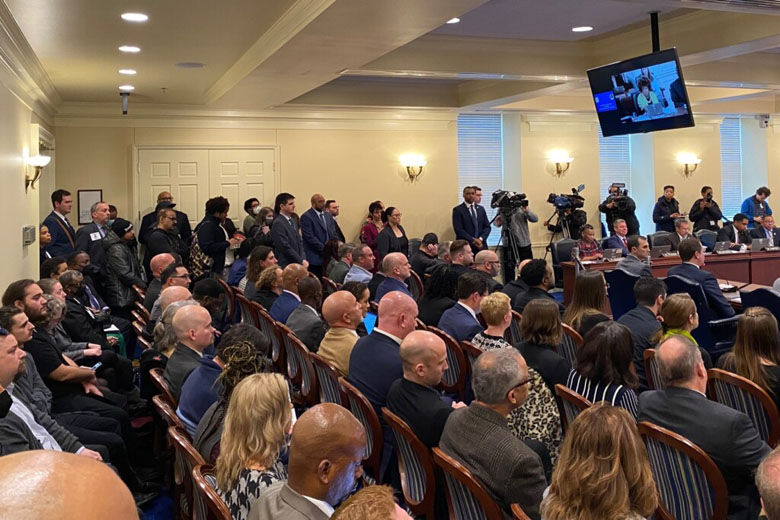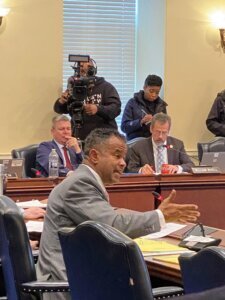This article was republished with permission from WTOP’s news partners at Maryland Matters. Sign up for Maryland Matters’ free email subscription today.
This content was republished with permission from WTOP’s news partners at Maryland Matters. Sign up for Maryland Matters’ free email subscription today.
No one really complained about the 88-page bill. In fact, most of the witnesses testifying Friday afternoon had nothing but high praise for the sponsors and their efforts. Well thought-out. A national model. Inclusive. Equitable.
The scores of people who packed the House Economic Matters Committee room just had a couple more thoughts about the legislation to regulate legalized cannabis, from farm to rolling paper: Favorable with amendments.
Some worried about clean-air violations in areas where tobacco smoking is already prohibited. Some predicted it would cripple the hemp industry. Some warned of children in search of candy gobbling up look-alike CBD gummies. Some simply wanted a piece of the action from the money brought in by the state taxing the sales.
The long afternoon-into-evening hearing began with the lead sponsor, Del. C.T. Wilson (D-Charles), introducing the bill to the Economic Matters Committee, which he chairs.
“As I’ve said more than a couple times, I’m not here to create a cash cow for the state or just a marketplace for the intoxicants; I’m here to make sure we stop young folks from being arrested and dying because of this substance,” Wilson said. “We’re here to try to regulate this so we can have safe usage, but basically get rid of the black market.”

Later, he repeated the idea, saying, “We have to be able to be competitive with the illicit market” to undercut it.
Under the legislation, a new regulation and enforcement division would be created within the current state Alcohol and Tobacco Commission, which would be renamed the Alcohol, Tobacco and Cannabis Commission. All dispensaries would sell both medical and recreational cannabis, and medical marijuana licenses would be converted under the new licensing structure, Wilson explained.
The bill provides for the state to tax the sale of cannabis at a rate of 6 percent initially — the same as Maryland’s sales tax — up to 10 percent in 2028. The sales would be taxed at the consumer level only.
Economic Matters Committee members asked a few questions of Wilson and Will Tilburg, executive director of the Maryland Medical Cannabis Commission seated with him at the witness table, before he returned to chair the meeting. The bill’s cosponsor, Del. Vanessa E. Atterbeary (D-Howard), chair of Ways and Means, sat next to the chairman’s seat.
Witnesses all seemed to praise the social equity element of House Bill 556, something that had been missing from the legislation that legalized medical marijuana a few years back. It was roundly criticized by some, particularly in the Black community.
The cannabis bill would establish a new Office of Social Equity in the cannabis division to promote participation by “people from communities that have previously been disproportionately impacted by the war on drugs,” Wilson said, echoing language in the bill.
That effort would include creation of both a Community Reinvestment and Repair Fund, to allocate money to the traditionally affected communities, and Cannabis Business Assistance Fund, to increase minority participation in the program.
One delegate, the former Legislative Black Caucus chair, questioned Wilson closely on the matter of minority participation.

“I know this is a huge undertaking and a heavy lift, and I just want to make sure that we get it right,” said Del. Darryl Barnes, (D-Prince George’s). “Looking at the lessons learned when we did medical cannabis … we issued 15 licenses – and all 15 of those went to white men. So, how are we ensuring that we are talking about equity and inclusion and getting more minorities to participate in another billion-dollar industry coming before the state of Maryland?”
Wilson answered directly.
“We define ‘social equity’ … by zip code for all intents and purposes. If you lived in a zip code that had a 175 percent arrests for cannabis use, we would consider those ‘social equity areas.’ So, again, we have to be race neutral, but you know where I’m coming from. You know who was arrested more likely than not because of cannabis use. Not saying we use it all the time, but we sure get targeted for arrest.”
Del. Marlon D. Amprey (D-Baltimore) registered some concern about the concentration of licenses that would be issued in the social equity areas.
“I represent West Baltimore, where we have a lot of liquor stores in certain areas, a concentration of them, and one of the worries that people in my community have are … where are these dispensaries going to be located?” Amprey asked. “What does that look like?”
Wilson told him, “I understand your worry, and I believe we will be addressing that as far as how far they have to be from each other. Because the goal is to make sure they’re not going to be all in our communities, right?
“We do plan on addressing that with some specificity,” he said. “We would hope that the commission would not issue all the licenses in those same three square blocks, and everybody’d come there. Also, in the past, that’s not been something that could be trusted, so I believe as we move forward, if that becomes the will of this body, we will have some more specificity to determine how far apart they are from each other and how close together they can be, to make sure they’re not all focused on the same area.”
One of the 80 witnesses whose testimony was limited to two minutes before the committee was Donna S. Edwards, president of the Maryland State and District of Columbia AFL-CIO, who voiced support for the legislation and praised the efforts of the committee and chair.
“This bill is a once-in-a-lifetime opportunity to establish an entire industry from its inception, and Mr. Chair and the workgroup and this committee, you will have a tremendous legacy,” Edwards said. “Every part of how Maryland’s cannabis industry operates will be connected with the decisions made in this committee.”
She continued, saying “We applaud the social equity” piece of the legislation.
“There will be tens of thousands of workers in this billion-dollar business,” Edwards said. “Unions are the foundation in building social equity … and raising general wealth for workers, particularly workers of color. And I want to point out that in every state that has [legalized] cannabis, they have found that the cannabis industry employs 10 percent more minority workers than any of the industries in their state.”
Wilson told the assemblage that amendments to the legislation are due to the committee by next Wednesday, Feb. 22.
A cross-filed bill is sponsored by Sen. Brian J. Feldman (D-Montgomery), chair of the Senate Education, Energy and the Environment Committee, and Sen. Antonio L. Hayes (D-Baltimore City), a member of the Finance Committee.







